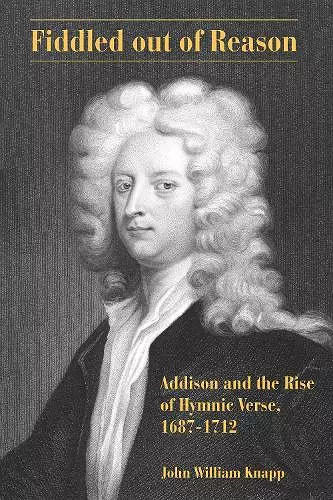Fiddled out of Reason
Addison and the Rise of Hymnic Verse, 1687–1712
Format:Hardback
Publisher:Lehigh University Press
Published:11th Apr '19
Currently unavailable, and unfortunately no date known when it will be back
This hardback is available in another edition too:
- Paperback£35.00(9781611462883)

Fiddled out of Reason is a study of several poems spanning the life and career of Joseph Addison, who, along with John Dryden, Alexander Pope, Ambrose Philips, Isaac Watts, and many British poets of the turn of the eighteenth century, helped to cultivate a broad new current of nonliturgical "hymnic" verse that became immensely popular across that century, though it has eluded critical notice until now. The texts the book examines—Addison's St. Cecilia's Day odes (1692, 1699), his libretto for the opera Rosamond (1707), and a sequence of five hymnic works in The Spectator (1712)—precede by twenty-five years John Wesley's publication of the first hymnal for use in the Church of England. The book argues that "secular" hymnic works such as Addison's emerged alongside religio-political controversies and anxieties about British national identity, morality, and expressions of "enthusiastic" passions. Church and Tory interests largely rejected hymnic verse, claiming it would only "fiddle" unwitting readers "out of their reason" and reignite the dangerous fervor of Revolution-era Nonconformity and Dissent. As is evident from his poetry, Addison, a moderate Whig, ardently opposed this view, arguing that the hymnic could in fact be a portal to national and individual amelioration. After an introductory chapter exploring period conceptions of hymnic poetry and the highly contested term "hymn" itself, the argument proceeds through three sections to trace the hymnic's upward trajectory through Addison's early, mid-period, and mature verse. The book devotes the lion's share of its attention to the last of these three, which includes the five-poem Spectator sequence (a poem from the sequence, "The Spacious Firmament on High," will be familiar to many readers). Indeed, in addition to offering new readings of hymnic works by Dryden and Pope, Fiddled out of Reason provides the first extended critical treatment of these five important poems. Publication of the book coincides with the 300th anniversary of Addison's death and with the appearance of a new Oxford edition of Addison's nonperiodical writings.
All of time, all of creation, all compacted in a quarter of a century: that is what John William Knapp gives us in Fiddled out of Reason: Addison and the Rise of Hymnic Verse, 1687–1712. Freeing hymns from their stereotyped attachment to specific creeds or even from religion generally, Knapp delivers a rigorous guide to the surprisingly complex genre of short but enthusiastic lyrical praise. . . . Knapp’s masterful analysis of odes, songs, panegyrics, ovations, and operas overleaps disciplinary boundaries while helping us to understand how so many effusive verses fit together in a shared tradition. -- Kevin Cope, Louisiana State University
John William Knapp's study of Addison and hymnic verse is lucid, learned, and important. It reminds us of the great value of a wrongly neglected author's achievements in a wrongly neglected genre. -- Howard D. Weinbrot, University of Wisconsin, Madison
[Fiddled Out of Reason] is a substantial and well-documented study that introduces Addison’s poetic oeuvre in the context of non-devotional church music and hymns of the period 1687 to 1812. The discussions here are keyed into an investigation into how authors seek an alternative to the well-documented moral and artistic risks of Italian opera and its English followers. -- Rosalind Powell, University of Bristol
Fiddled Out of Reason provides a close study of Joseph Addison’s sequence of five hymns, first published in the Spectator in 1712, as a way of recasting what it means to study the English hymn at the turn of the eighteenth century. -- Christopher N. Phillips, Lafayette College
ISBN: 9781611461602
Dimensions: 230mm x 160mm x 26mm
Weight: 599g
270 pages